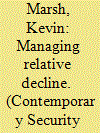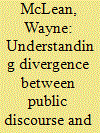| Srl | Item |
| 1 |
ID:
116296


|
|
|
|
|
| Publication |
2012.
|
| Summary/Abstract |
The Defense Strategic Guidance (DSG), released by the White House in January 2012, was widely acknowledged as the most significant reassessment of America's strategic posture in a decade. Sustaining U.S. Global Leadership: Priorities for 21st Century Defense is not simply a response to systemic-level threats and interests, but reflected principles best articulated by neoclassical realism (NCR). By examining systemic, domestic, and elite influences affecting the United States in 2012, this article demonstrates that the DSG illustrates the core principles of neoclassical realism. The strategy reflected the Obama administration's filtration of systemic-level imperatives through elite perceptions and domestic politics. The DSG is realist because it sought foremost to address systemic challenges, including American relative decline. It is neoclassical realist because the strategy was markedly influenced by elite perceptions and domestic politics, resulting in deliberate gambles. Neorealism continues to have great value explaining systemic trends, but it cannot explain the specific foreign policies of individual states. NCR provides a way to retain the most effective analytical features of neorealism while incorporating the influence of domestic politics and elite perceptions on state policy-making. Neoclassical realism is a promising theoretical framework for foreign policy analysis, but further testing and refining is needed to ensure that it retains its descriptive accuracy and predictive capability.
|
|
|
|
|
|
|
|
|
|
|
|
|
|
|
|
| 2 |
ID:
142291


|
|
|
|
|
| Summary/Abstract |
This article explores the divergence between public discourse and Turkish foreign policy practice in the context of Turkey's regional pressures. It argues that divergence occurs because elites rearrange the hierarchy of domestic ideas that connect with foreign policy. This allows them to respond to regional threats appropriately, without undue interference from domestic political forces. Thus, to achieve optimal strategic outcomes, Turkish elites use emotive language around topics less likely to impact the immediate security, such as the USA and Israel, while deemphasizing higher order issues, such as Syria and Iran, which do have considerable security implications.
|
|
|
|
|
|
|
|
|
|
|
|
|
|
|
|